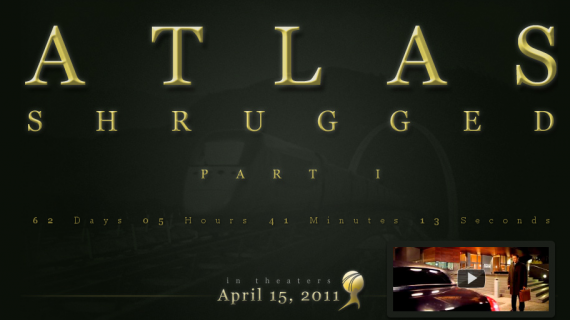Are we Living in the Nightmare that Rand Predicted?
Is our current economic situation the result of massive government intervention? The Randians certainly think so.
 I must confess, based on what I have read and the clips I have seen, I am hardly planning on camping out to see Atlas Shrugged (Part I). See, for example, James Joyner’s write-up on his experience of the sneak preview.
I must confess, based on what I have read and the clips I have seen, I am hardly planning on camping out to see Atlas Shrugged (Part I). See, for example, James Joyner’s write-up on his experience of the sneak preview.
One thing that the movie will do, however, is spark conversation about Ayn Rand and, especially given the current zeitgeist, one about the role and scope of government in general.
To wit, a piece at NPR from yesterday: The Rampant Rise Of Ayn Rand-O-Mania which includes the following that struck me:
The similarities between the world Rand describes in Atlas Shrugged and contemporary America “are striking” and explain the rise of the Tea Party, according to a video by the Ayn Rand Institute. “In Atlas we see a world crumbling under the weight of government interventions and regulations. The economy has ground to a halt. Each day more and more businesses are shutting their doors. The government blames greed and the free market, and frantically imposes further controls. But the crisis only deepens. Sound familiar?”
The thing is: no, it doesn’t (although I can understand why the Ayn Rand Institute would like to assert such).
Here’s the thing: one of the basic sources of the recent economic downturn was the result of the housing bubble. The housing bubble was driven primarily by two factors. First, it was driven by consumers who wanted more house than they could afford and driven by the assumption that said homes would continue to increase in value to the point that they used said homes as piggy banks (via home equity loans) and/or as profit centers (via flipping and the like). This voracious appetite for real estate was enabled by a second factor: the willingness of financial institutions to loan money, often using any number of risky instruments (like interest only loans) that put consumers in a bind once they found themselves in homes no longer worth the purchase price. And, of course, lots of consumers looking for ever-more-expensive homes and financiers willing to loan money meant builders building too many houses.
Beyond housing, per se, we have to remember that the Great Recession was started as a crisis of financial institutions, linked largely to the above-noted loans. The crisis in financial institutions sparked a wider array of economic difficulty.
While one can argue that such government policies as low interest rates, Bush’s “ownership society,” the mortgage interest deduction, and other policies encouraged the above cycle, it is rather difficult to state that it was excessive government intervention and regulation (especially of the financial sector) that led to the housing bubble and the above-noted shuttered businesses.
Further, the massive government interventions that we have seen of late, i.e., TARP in 2008 and the 2009 stimulus bill, the 2010 tax compromise (which was also a stimulus) were after the Great Recession was underway. As such, the issue is not businesses shuttering because the government had engaged in massive interventions, but rather the government intervening to prevent further businesses from shuttering. Indeed, regardless of what one things of the policy, it was direct government intervention that stopped any number of financial institutions from shuttering, not to mention General Motors and Chrysler. As such, the above quote has some basic cause and effect problems (to say the least).
Indeed, the appropriate Randian solution to the Great Recession should have been massive shuttering of financial services companies and two major auto manufacturers. While I can understand why one might think that the market should have been allowed to engage in ye olde “creative destruction” in these cases, it is difficult to make the case that it was the government’s fault that businesses were going under when, in fact, the government stepped in to prop them up.
There is also the fact that we are hardly in the most regulated era of our history (think back to the 1970s, for example).
All of this is to say that while there is a legitimate debate to be had about the relative size of government and its role in the economy, but such debate need to be honest ones.






There are a couple good bits in this related Felix Salmon post:
and
The Randians also think that quantum mechanics is wrong. I doubt their economic views are much more useful than their views on physics – both are based on philosophy rather than experimental evidence.
A great quote from screenwriter and producer John Rogers: There are two novels that can change a bookish fourteen-year old’s life: The Lord of the Rings and Atlas Shrugged. One is a childish fantasy that often engenders a lifelong obsession with its unbelievable heroes, leading to an emotionally stunted, socially crippled adulthood, unable to deal with the real world. The other, of course, involves orcs.
My thought as I read Rand post-graduation, was that it was a perfect antidote to all the subliminal messaging in California public schools (through Cal State).
But you know, an antidote shouldn’t be a diet. Once taken, move on.
The regulation thing still intrigues me. I think it pretty clear that we were much more heavily regulated in the 60s and 70s., but I hear claims that we are more regulated now. Hard to prove one way or another i guess.
Steve
Read the Ritholtz blog for a few months.
It may well be that “pages of regs” expanded or something, but I think it’s pretty clear that critical elements of banking and financing were deregulated, and beyond that, enforcement in the Bush era was very, very, lax.
They put Christopher Cox in at the SEC on the condition that he take long naps.
I have no patience for the Randians. If you think Atlas Shrugged is bizarre, try the Fountainhead. That book cured me forever of the belief that it was good to always finish reading a book you start.
That said, it’s pretty disingenuous to describe government influence in the housing market without mention of Fannie Mae, Freddie Mac and the FHA.
A significant contributor to the housing bubble was the nonsense that took at place at Fannie Mae and Freddie Mac, which can certainly be laid at the feet of government, and especially after some members of said government went out of their way to stop all attempts to investigate or control it before the bubble burst. won’t say “government” caused the housing bubble but they should helped inflate it. Not to mention the moral hazard and costs that came with the bailouts of individuals and institutions that did wrong.
I would also take great issue with the efficacy of the government’s attempts to fix any of these problems. Fundamentally they aren’t as smart as they think they are and all such attempts seem to breed corruption at the highest levels.
But it’s always fan to take the outliers of a group, in the case Randians, and attribute all sorts of their nonsense to anyone who has any agreement with Ayn Rand.
“While I can understand why one might think that the market should have been allowed to engage in ye olde “creative destruction” in these cases…”
That’s one thing some people don’t get. The broken window fallacy doesn’t necessarily work in a purely free market system, either. If someone would stop the rock from hitting the window mid-flight, you can avoid that broken window and everyone (except the rock thrower) would be much better off.
Yes, the government has in the past, is still doing today, and will tomorrow go far beyond any reasonable measure of correcting for market failure but we still, at least to some degree, need that. Otherwise we’re going to have a lot of broken windows as the Galts of society do everything in their power to take advantage of the witless.
What does significant mean? Take Fannie an Freddie away and there would still have been a bubble and it still would have burst. Are they blameless? Not by any means. Are they the highest priority in preventing a relapse? Probably not. But I guess the small government freaks need a focus for their fantasies.
“The housing bubble was driven primarily by two factors.”
This sounds overly Santelliish to me. Blame the consumers? Who loaned them the money? And who is the more responsible party in the transaction, the professional mortgage lender or the armature mortgage borrower? Sure, some people, flippers, were well aware of what they were doing but the average home buyer, not so much. When somebody should have been telling them we can’t let you borrow so much they were instead being encouraged to borrow more. They were being bombarded with phone calls and mail practically begging them to refinance. The consumers didn’t invent new varieties of mortgages so they could borrow too much and they didn’t invent collateralized debt obligations or credit default swaps.
@Charles:
So, you think if there had been better regulation and oversight of Fannie Mae and Freddie Mac that some of the problems could have been averted.
@Scott:
I think you only saw the first factor in my list. The second was:
@Steven, I saw it, I just don’t see the consumers as deserving of anywhere near half the blame, as is implied, for the housing bubble and subsequent burst.
@Scott
“This sounds overly Santelliish to me. Blame the consumers?”
Not all customers, but the ones who were willing participants in fraud, yes. Putting down false income information does justify laying equal blame to them.
I should clarify “justify laying equal blame to them” – not equal blame for the financial crisis, but for whatever equitable level they were a part of it, sure. The outstanding participation of the lenders who are supposed to have a much better understanding of the market, who decided to ignore the dangers they were plunging into (Herbert Stein’s Law, anyone?) just to make a quick top dollar… these organizations weren’t too big to fail, as they were called — a friend of mine, Niklas Blanchard put it much better: these institutions were too brittle to sustain, and they did it to themselves.
Guess these guys have not heard about record corporate profits and the mountains of cash that so many corporations are sitting on.
Not going to quibble with anyone about Fannie & Freddie. I will say however that the cult of Ayn Rand baffles me. Granted, I have only read 2 books by her (The Fountainhead & Atlas Shrugged), but I just don’t see her as being that prolific of an author. In fact, my little sister should probably stab me in the eye for giving her Atlas Shrugged for her birthday a few years back. Either way, I fully intend to see the movie sooner rather than later. I just can’t pass up some government takeover fiction.
@Schismatism, I still think the lender is the more responsible party. Isn’t it up to him or her to verify the income, unless of course they don’t care. Which in many cases they didn’t because they found very willing bigger fools to buy those mortgages.
@Talmadge East
There’s a reason why Ayn Rand’s work is so attractive to the egotistical, self-centered and indestructible supermen that are teenagers. The Fountainhead and, moreso, Atlas Shrugged, are the Twilight of that era.
@Scott:
No doubt, I wouldn’t lay equal blame on the fraudulent borrower and the irresponsible, equally fraudulent lender who advised the borrower it’s ok to falsify information on the loan application, which is what happened all too often (everyone was doing it, so it’s ok, right?). Placing the greater blame on the individual borrowers, whether they were criminally liable as well or not, for the financial crisis as the Santellis of the world want to, is an even more egregious suggestion. These lenders are supposed to know the stakes much better than the borrowers. Yes, the borrowers have the responsibility to know what they’re getting into but they don’t have the billions of dollars worth of financial and market data to assess whether the investment is sound. The lenders chose to ignore the signs of an impending bubble burst.
All this simply shows that Ayn Rand’s thesis which comes down to “Do as thou wilt shall be the whole of the law” is faulty to say the least. Even the Satanists who espouse that golden rule understand community and some level of altruism is necessary in order to get what you want.
@Schismatism, Agree entirely. I guess I get a bit peeved about blaming people who wanted a second bathroom. About a year ago a relative of mine who I suspect gets most of his information from right wing radio and Fox news told me that’s what caused the financial crisis. The part of this article I quoted earlier seems split the blame. It just seems to me that the lenders deserve about 99% of the blame.
I think we also need to hold folks who pumped money out of their homes to buy boats and take trips to Tuscany accountable as well.
Hey Norm:
Hah. Lovely Rand/Tolkien quote. And so true.
@anjin-san
Problem is many want to concentrate the blame on low income and minorities who couldn’t justify their fraudulently reported income when, in fact, much of the housing bubble was commercial (really, it was a construction bubble) and middle class people overpraising themselves. As I said, the borrowers who committed fraud should get equitable blame, for the part they had in the crap storm, but, in reality, they weren’t anywhere near as significant a source of the problem as the lenders.
No credible person is saying we shouldn’t blame these borrowers — they deserve equitable blame — but our actions are letting the bankers off the hook. Those borrowers who didn’t commit fraud get what they deserve: they lose their shirt. Those borrowers who commit fraud lose their shirts and get fined or spend a chunk of lifespan in the clink. Those lenders who committed fraud, some may lose some thread off their shirts, but they’re getting away scot-free.
I can’t remember if I read both books. I doubt it. I know I read the one about the architect (“The Fountainhead”?) when I was about 29. What a load of tripe. The “characters” were nothing so much as fourteen year old kids who have absolute, immovable opinions about pretty much everything, and sit around dissing the “idiots” whose opinons don’t mesh with theirs. I don’t think I’ve ever read a book that was more about “rules for being in a teenage club” (You must hate this type of thing, and love this type of thing. You must always assert your opinion loudly. You must always concede Ayn Rand is the alpha dog.” Why? Well, if you have to ask you are obviously not in the club.
Does anyone remember the crank book from the 80’s or 90’s where someone goes down to South America where all the “right” people have gone and built a Utopia? It was a New-Age thing on the best seller lists forever. Despite being New-Age as opposed to fascist, the first few chapters (which was all I was able to stomach) reminded me of Rand.
Don’t follow Charles into Freddy and Fannie being responsible for the bubble. Fails on fact. Period.
Now, Freddy and Fannie are bad for other reasons, principally looting.
@Steven, apologies if I came off as rude earlier. By my estimate your article was at least 99% spot on.
:)heehee…..
Her Randiness helped us all along onto the shitpile when she took Medicare and Social Security (under an assumed name). The bitch.
There are a couple key problems I have with Randian ideology (it is not philosophy).
One is that it absolutely demands in no uncertain terms that you overestimate your competence. In a world where way too many people are not smart enough to realize they are not smart – this is scary dangerous.
Two is that it stands in absolute opposition to even the faintest of charitible urges. How the family values/christianist right came to adopt an anti-christian ideology is beyond me, but the Taoist in me is fascinated.
Anyway – This is what I think of when I hear Paul Ryans name. Here is a guy who in a college dorm somewhere, which was paid for by the weathly parents he was lucky enough to be born to, read a couple books by Rand. Having his young, white, suburban mind sufficiently blown, he never bothered to read anything more by anyone else. Thus today we have the Tea Bag Manifesto, which rewards the successful, to the detriment of absolutely everyone else. Tax hikes for 90% of the country, and the sick, the poor, and the elderly get tossed out to fend for themselves.
Unfortunately for the United States of America there is a sizable cult out there, many of whom like Ryan are white suburban and weathy, who walk around with tea bags dangling from their hats. They also have never had an independent thought of their own and have totally bought into this guys garbage. (Consider the mainstream media outlets and most right-wing blogs willing participants in this cult – see Chait for more on this).
I think Obama took a big step in countering this yesterday. My question is if the Presidents speech started the snowball down the hill and it will pick up momentum and size, or if the heat from the right wing echo machine will simply melt it away.
Sam…
That’s interesting…do you have a souce for that info?
Steve: “The regulation thing still intrigues me. I think it pretty clear that we were much more heavily regulated in the 60s and 70s., but I hear claims that we are more regulated now. Hard to prove one way or another i guess.”
We’re seeing a highly revisionist pack of lies being sold; NOW all of the people who were praising deregulation and predicting a brave new world are pretending that we had an increase in regulation.
I recall the WSJ in the 1990-94 period predicting gloom and doom (Bush I’s tax increase, Clinton’s tax increase) and loudly and specifically proclaiming that the Reagan Era was over. In the late 90’s they changed their tune, and said that the good times were due to Reagan.
anjin-san says:
“I think we also need to hold folks who pumped money out of their homes to buy boats and take trips to Tuscany accountable as well.”
It’s the moral (and frequently legal) burden of the lender to do that; in addition the lender is supposed to be the professional in this deal.
What happened to a large degree I believe was that the Financial Galtian Geniuses realized that they could sucker large numbers of buyers into buying fraudulently constructed securities, using sufficient complexity to hide the real situation. And I say ‘fraudulently constructed securities’ because they were sold as AA and AAA grade, which means that they should have survived some pretty bad times, and definitely not have been the trigger on the catsrophe.
Sure, too numerous to list –just google ‘rand social security medicare’
@Schismatism
That’s an interesting gloss, if accurate. It’s been years since I read AS. (I do remember thinking the book was like a Batman comic with bigger thought balloons).
I know she hated Kant for his concept of moral duty. However, if your version of her thesis is correct, that’s simply Kant’s categorical imperative — but enunciated by a moral solipsist. Or a simple-minded Nietzchean.
No reason to suppose she was really that well schooled in philosophy, though. I’m not aware that she had a developed epistemology or theory of action or what not. Her stuff struck me as coming mostly from Captain Ayn’s Philosophy Whiz Bang.
Ayn Rand is not Kant in much the same way that I am not Shakespeare.
With the great bubble three years behind us and post TARP/TALF/HAMP/FCIC/everything, the debate on who to blame rages on and it appears little has been learned and maybe even less fixed. For the most part, completely innocent bystanders (your average taxpayer who had absolutely no role in the debacle) have been forced to pay for the missteps of the culpable. As for the most culpable, my vote does go to Fannie and Freddie over greedy consumers placing what ultimately turned out to be overly aggressive losing bets, lenders who are somewhere between redlining bastards or predatory bastards, bought and paid for ratings agencies, legions of incompetent mba carrying pension fund managers looking for that extra 1/2% of yield, and the smartest guys in the room bankster/bookies. Lots of greedy group-think to go around for sure, but the GSE twins acted as the enabler instead defacto regulator capable of being the choke-point which would have stopped the cycle. No Fannie/Freddie buying crappy loans and the whole mess never happens. Lenders would not have made risky/outright crap loans without a source to offload them to. It follows no bundles, no MBS, no CDO, no meltdown. Admittedly, this is the distilled simple version, but there are some distressing take-aways. It is of more than passing concern how little things have changed. Many of the very same ‘smartest guys’ who ran the ship aground were allowed to prescribe the remedy and are still around today while moral hazard in the financial system may well be at an all time high.